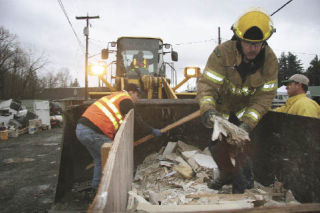For the Cleven family of Snoqualmie, as for many Valley residents, the weekend was a time to take stock of damages and begin the hard work of flood cleanup.
The Clevens spent Sunday hauling out flood-damaged items from their crawlspace and former garage, where water crept 15 inches up from the floor.
In his 21 years in the Valley, Roger Cleven said that only the flood of 1990 was higher than the Wednesday, Jan. 7, event.
The flood has made him rethink the wisdom of storing items at ground level.
“It looks like we won’t have as much stuff down here,” he said.
Outside of the Cleven home, vehicles lined up for several blocks, bringing soaked household items, damaged appliances and soggy drywall to the city flood debris disposal station at King Street and Falls Avenue, one of two disposal stations that opened in Snoqualmie last weekend. The other was located at Centennial Fields.
When the King Street lot opened on Friday, Jan. 9, the first truckloads of debris were ruined furniture and sofa after soggy sofa. By the weekend, residents had gotten around to the walls, tearing out drywall and insulation.
Greg Bissell waited in line with a trailer load of Christmas trees and other debris that flowed into his Snoqualmie neighborhood during the flood.
“Everything ends up at Northern Street,” said Bissell, who found that the nastiest thing to clean up was someone’s old garbage can.
Volunteer efforts got into full swing shortly after the water subsided. At Mount Si High School, volunteers first gathered Friday morning for a work party, clearing debris from the grounds. A private company tackled cleanup of the interior, where a few inches of flood water had seeped into low-lying areas.
Mount Si students Tabby Rollins and Heidi DeHart were among a hundred-odd volunteers who raked up flood debris at the high school entrance on Friday morning.
“I don’t want to go to school in the summer,” Rollins said. “The only way to do that is to clean up everything right now.”
What’s in the water?
The flood spread a wave of muck and filth through much of the Valley. Anything touched by the filthy water needs to be well cleaned or discarded.
“Just about anything you can imagine is in that water,” said Snoqualmie Interim Public Works director Alan Lobdell. “You’ve got farm debris, animal debris, sewers that have boiled out into the rivers, oil, every bit of debris on roads.”
Food touched by tainted water should be thrown away; clothing and canned goods should be washed or tossed.
Debris cleanup started as soon as the water level went down, and is expected to go on for weeks.
“We just don’t know how much garbage is going to be out there,” Lobdell said. “But it’s going to be a mess.”
Debris drop-off
The King Street disposal site is expected to remain open through Sunday, Jan. 18. Hours of operation are 8 a.m. to 3 p.m. on weekdays and 8 a.m. to 4 p.m. on weekends.
Snoqualmie city officials recommend that residents contact their insurance company before discarding debris.
“It’s really important that people report their losses to King County this week,” said Snoqualmie communications coordinator Joan Pliego.
Reporting damage is important because it helps the state analyze the extent of the floods. People may also be able to recoup costs of repairs.
Residents should photograph and inventory all losses and damages, and should call their insurance adjustor before disposing of debris.
Sandbags may be dropped off in downtown Snoqualmie at Railroad Place, just past the Centennial Log. Flood clean-up kits are available at the King Street lot.
Requests for damage assessment can be made by calling (425) 888-5911. City officials will assist to the extent possible. A King County damage assessment and report hotline is available at 1 (800) 523-5044. Forms will be available online at www.kingcounty.gov/prepare.
Water pumping assistance by the city of Snoqualmie may be provided upon request to those who need help. The city will not assist general residences with pumping.
How to help
The Snoqualmie Emergency Operations Center is coordinating volunteer and donation efforts.
Volunteers can still get involved to help in clean-up efforts, and donations of needed household items, including couches, mattresses and appliances are being sought.
Those who would like to help with flood cleanup in downtown Snoqualmie can sign up by calling the Emergency Operations Center at (425) 888-5911.
Volunteers under the age of 18 must be accompanied by an adult. Residents affected by the flood who need help with clean-up may request volunteer help by calling the same number.
People who need donations can contact the EOC, and those who have items to donate, or who want to donate, should also contact the center.
The city is working on putting together a long-term housing program for local residents who need a place to stay. Those who need a place to stay locally, as well as those who may have room for someone to stay, should contact the emergency center.
The Snoqualmie EOC will remain open until further notice, and the hotline is staffed from 7 a.m. to 7 p.m.
Tips on staying healthy during a flooding disaster are available at www.osha.gov/OshDoc/flood-tornado-recovery.html#fact.



